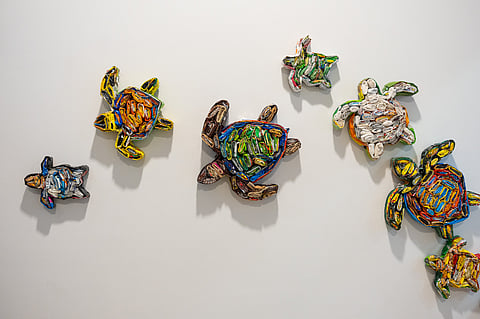

In a world spinning faster than our minds can catch up, we rarely stop to weigh the words that shape it. Capitalism. Climate. Consumerism. Conservation. These aren’t just terms anymore — they’ve become buzzwords we scroll past, headlines we half-read.
Kiran Nadar Museum of Art’s ‘Slow is the New Urgent’ exhibition, set in the overlooked passage between Select Citywalk and South Court Mall in Saket, flips the script on consumer culture and fast living. It invites passersby to pause with the words we throw around and actually reflect.
“This was a liminal space. Completely dead, with very little footfall,” says curator Avik Debdas. “Mall-goers and people working nearby would usually move between the two malls, but no one really walked through this passage.” That made it the perfect spot for public art. “The exhibition focuses on public art, engagement, and interventions in shared spaces.”
Featuring 11 contemporary artists from across India, this pop-up transforms a forgotten corridor into a space for critique. It tackles big themes from consumerism, climate change, to technology’s impact on our lives, and digital surveillance.
The passages begins at the ‘Turtle Trail’ by Delhi-based artist Manveer Singh, aka Plasticvalla. It features a trail of multicolored olive ridley turtles made from folded multi-layered plastic (MLP) — the kind found in snacks packets. “Manveer runs the NGO Plasticvalla, and all the plastic used here is collected through a door-to-door donation system,” says Debdas.
“People contribute plastic waste. Over the past few years, Manveer and his team have recycled several tonnes of it through art.” The turtles aren’t just aesthetic, they carry a message. “Their slow movement inspired the exhibit’s title, ‘Slow is the New Urgent’. It’s a call to rethink our pace and the waste we leave behind,” adds Debdas. These whimsical models of this endangered turtle line the walls and hang from the ceiling all throughout the passage — from entrance till the end.
Another standout piece takes a jab at beauty standards and the male-dominated beauty industry. Artist Anshu Jakhar created two fictional products — ‘Vaginal Tightening Cream’ and ‘Virginity Reversal Pill’ with a QR code. Visitors who scan the code are redirected to a website where those who enter their details are sent a mail — which tells them the products aren’t real — an artistic critique of how virginity and female bodies are commodified. The exhibit launched on April Fool’s Day. “We distributed pamphlets and posters across the neighbourhood and in newspapers. The mall emailed us asking to take them down, thinking they were real ads. We had to explain — the ad itself is the critique.”
Similarly Tahsin Akhtar’s ‘In Constant Flicker’ — addresses digital surveillance through a five-minute video projected onto objects — a bucket, a flower pot, and a pointed index finger. “It mimics how we use our phones, how we’re constantly watched, not just by others, but by the very devices we hold closest,” Debdas says.
As the video plays, the projection of shutter opens and closes nearby. Imagery of falling data, a listening ear, and swiping fingers reflect passive data collection. And the visual of a butterfly morphs into a drone, fusing beauty with threat.
Debdas calls it “a contemporary watchtower,” referencing George Orwell’s 1984 and Michel Foucault’s panopticon — a system of invisible surveillance. “But instead of a government, it’s the corporate regime watching us. We’re the prisoners, and our screens are the cells.”
For Debdas, the exhibit isn’t only about climate change or conservation — but the related concerns that are woven into it. “Environmental degradation is part of the production system we’re living in. And because this is a liminal space between two malls, it becomes a way to critically reflect on these ideas — which is really at the heart of the show. The exhibition comes from that idea: rethinking how we consume in today’s world.”
On till June 30, at KNMA ART Passage, near Apple Store, Nexus Select Citywalk Mall, Saket from 11 am onwards